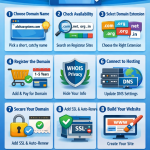What is FinOps?
FinOps, short for Financial Operations, is a collaborative approach to cloud financial management. It brings together finance, engineering, and business teams to monitor, control, and optimize cloud costs effectively. Instead of treating cloud expenses as fixed costs, FinOps encourages businesses to continuously analyze, adjust, and improve cloud spending to make smarter financial decisions.
Key Principles of FinOps
To understand FinOps better, here are some important principles that guide its implementation:
- Visibility & Transparency – Companies must track and analyze their cloud expenses in real time.
- Financial Accountability – Teams should take ownership of their cloud spending and optimize it efficiently.
- Collaboration Between Teams – Finance, IT, and business units work together to balance costs, speed, and performance.
- Data-Driven Decision Making – Businesses use cloud usage data to make informed cost-saving strategies.
- Continuous Optimization – FinOps is an ongoing process rather than a one-time cost-cutting measure.
Why is FinOps Important?
Many businesses move to the cloud believing it will reduce their expenses. However, without proper financial control, cloud spending can increase rapidly. FinOps helps organizations maintain cost efficiency without compromising performance.
Benefits of Implementing FinOps:
- Reduces unnecessary cloud expenses
- Improves budgeting and forecasting accuracy
- Enhances collaboration between finance and engineering teams
- Provides real-time insights into cloud spending
- Encourages better decision-making for cloud investments
By adopting FinOps, companies ensure they pay only for what they need and get the most value from their cloud services.
How Does FinOps Work?
FinOps is implemented through three key phases:
- Inform – Understand Cloud Costs
In this phase, businesses analyze their cloud spending using cost-tracking tools. It helps them understand:
- Which services are consuming the most budget?
- Are there any unused or underused resources?
- Can they optimize cloud usage without reducing performance?
- Optimize – Improve Cost Efficiency
Once companies identify cloud cost patterns, they start optimizing usage. This may involve:
- Rightsizing resources – Adjusting computing power based on demand.
- Using discounts & reserved instances – Leveraging cloud providers’ pricing models.
- Automating scaling – Ensuring cloud resources match business needs dynamically.
- Operate – Maintain Cost Control
FinOps is not just about reducing costs—it’s about continuously improving cloud management. Businesses must:
- Regularly review cloud expenses
- Encourage accountability among teams
- Ensure performance remains high despite cost optimizations
This cycle repeats as businesses evolve, helping them maintain an efficient cloud strategy.
FinOps in Major Cloud Platforms
Most cloud providers offer built-in tools to help businesses manage costs:
- AWS FinOps
- AWS Cost Explorer – Tracks cloud spending trends.
- AWS Budgets – Sets cost limits to prevent overspending.
- AWS Compute Optimizer – Suggests ways to optimize cloud resources.
- Microsoft Azure FinOps
- Azure Cost Management – Provides detailed expense reports.
- Azure Advisor – Recommends ways to improve cloud performance efficiently.
- Google Cloud FinOps
- Cloud Billing Reports – Helps businesses track spending and optimize cloud use.
- BigQuery for FinOps – Uses AI-driven insights to analyze and optimize costs.
These tools help companies implement FinOps practices effectively on their cloud platforms.
FinOps Foundation & Certification
The FinOps Foundation, part of the Linux Foundation, provides training and certifications to help businesses implement FinOps successfully. Professionals can pursue certifications to improve their understanding of cloud financial management.
Popular FinOps certifications include:
- Certified FinOps Practitioner – Covers basic FinOps concepts.
- FinOps Certified Professional – A more advanced certification for cloud cost management experts.
Companies investing in FinOps training ensure their teams have the skills needed to optimize cloud spending efficiently.
FinOps as a Service
Some businesses prefer outsourcing cloud financial management instead of managing it in-house. This is called FinOps as a Service (FaaS).
Key benefits of FinOps as a Service:
✔ Expert-led cloud cost optimization
✔ Automated cost-saving solutions
✔ Continuous monitoring of cloud expenses
Several companies, including Apptio, Flexera, Harness, and Ternary, provide FinOps services to businesses worldwide.
Final Thoughts: Why Should Businesses Embrace FinOps?
Adopting FinOps is essential for businesses that rely on cloud computing. With the rising costs of cloud services, companies must ensure every dollar spent delivers maximum value.
By integrating FinOps, businesses can:
✅ Optimize cloud spending without sacrificing performance
✅ Encourage financial accountability across teams
✅ Make informed decisions using real-time cloud cost insights
If your company is looking to scale its cloud operations efficiently, FinOps could be a game-changer in managing financial resources effectively.
Would you like more insights on FinOps implementation for your business? I’d be happy to help tailor strategies for you! 🚀






